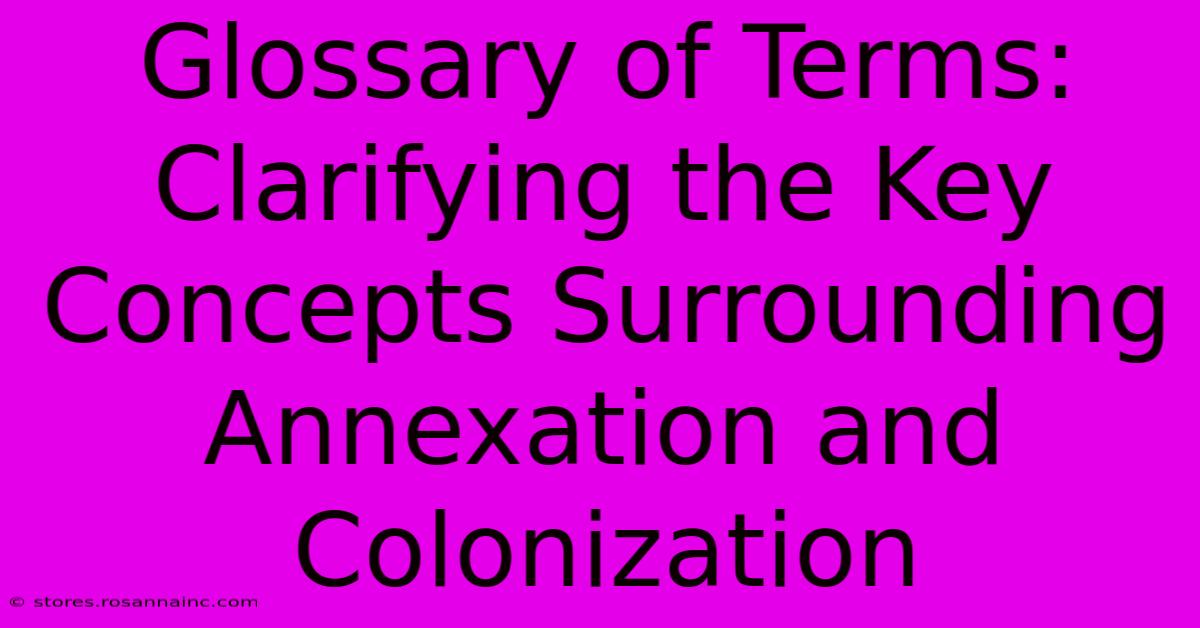Glossary Of Terms: Clarifying The Key Concepts Surrounding Annexation And Colonization

Table of Contents
Glossary of Terms: Clarifying the Key Concepts Surrounding Annexation and Colonization
Understanding the historical and ongoing impacts of annexation and colonization requires a clear grasp of the terminology used to describe these complex processes. This glossary aims to clarify key concepts, differentiating between similar terms and highlighting their nuances.
Key Terms Explained:
Annexation: The formal act of acquiring territory by a state, typically by incorporating it into its own sovereign territory. This process often involves the subjugation or displacement of existing populations. Crucially, annexation implies a claim of sovereignty, often without the consent of the inhabitants of the annexed territory. It's a legal act, even if ethically questionable.
Colonization: A broader term than annexation, encompassing the establishment and maintenance of political and economic control over a territory, usually involving significant demographic changes. This control often takes the form of settlement by people from the colonizing power, coupled with the exploitation of resources and labor. Colonization can involve annexation, but it also encompasses situations where formal annexation may not occur, yet control is nonetheless exerted through military might, economic leverage, or political manipulation.
Imperialism: A policy of extending a nation's power and influence through diplomacy or military force. Imperialism often drives both annexation and colonization, providing the overarching ideology and justification for acquiring and controlling territories. It's the overarching strategy, with annexation and colonization as its tactics.
Sovereignty: The supreme authority within a territory. A sovereign state has the power to govern itself without external interference. Annexation directly challenges the sovereignty of the annexed territory, while colonization can undermine sovereignty gradually through various means.
Indigenous Peoples: The original inhabitants of a territory, often possessing a distinct culture, language, and history predating colonization. Their rights and well-being are often severely impacted by both annexation and colonization. Understanding their perspectives is critical to a full comprehension of these processes.
Conquest: The subjugation of a people or territory through military force. Conquest is frequently a precursor to both annexation and colonization, providing the means to assert control over a territory.
Settlement: The establishment of a permanent community in a new territory. Settlement is a key aspect of colonization, often involving the migration of people from the colonizing power to the colonized territory. This can lead to demographic shifts and displacement of indigenous populations.
Exploitation: The use of a person or group for selfish purposes, particularly in a manner that is unjust or unfair. Economic exploitation, involving the extraction of resources and the underpayment of labor, is a central feature of colonization.
Decolonization: The process of undoing the effects of colonization. This can involve political independence, repatriation of resources, redress of past injustices, and the restoration of cultural practices and rights of indigenous peoples. Decolonization is not merely about political independence, but also a complex process of societal, cultural, and economic transformation.
Distinctions and Overlaps:
While these terms are related and often overlap, it's crucial to understand their distinct meanings. Annexation is a specific legal act, while colonization is a broader process that may or may not involve annexation. Imperialism provides the ideological framework, while conquest often provides the military means. The impacts on indigenous peoples are central to all these processes.
Understanding the Nuances:
The vocabulary surrounding annexation and colonization is rich in nuance and reflects the complex historical and political realities it describes. A thorough understanding of these terms is crucial for analyzing past and present power dynamics and for promoting a more just and equitable world. Continued research and critical engagement with these concepts are essential for fostering informed dialogue and contributing to meaningful solutions. The legacy of these practices remains a powerful force shaping global politics and societies today.

Thank you for visiting our website wich cover about Glossary Of Terms: Clarifying The Key Concepts Surrounding Annexation And Colonization. We hope the information provided has been useful to you. Feel free to contact us if you have any questions or need further assistance. See you next time and dont miss to bookmark.
Featured Posts
-
Revolutionize Your Workflows Convert Word Documents To Google Docs Seamlessly
Feb 05, 2025
-
Gratitudes Echo A Heartfelt Thank You For Your Express Response
Feb 05, 2025
-
Unveiling The Next Generation Nail Treatment The Gel Bottle Biab Nails That Last
Feb 05, 2025
-
Embrace Riverfront Bliss Parkside On The Rivers Unforgettable Views
Feb 05, 2025
-
Red Hot And Ready To Rock Your Christmas Designs The Santa Hat Png You Cant Resist
Feb 05, 2025
